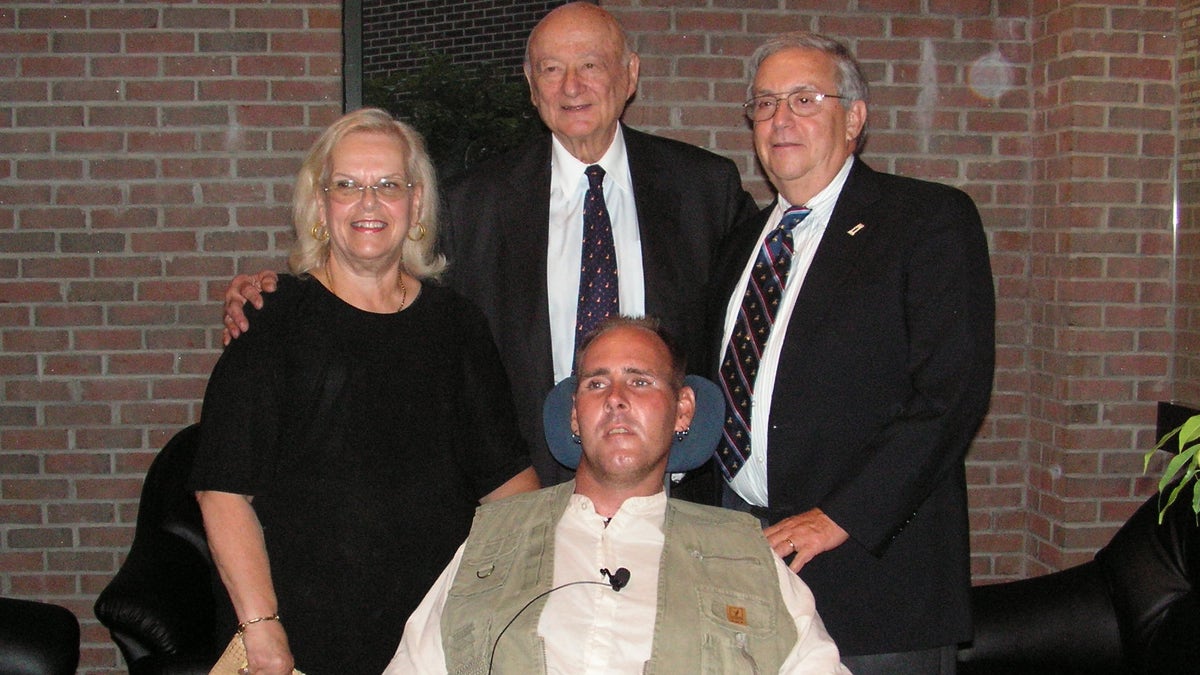
Steven Averbach, shown here with his parents, Maida and David, and former New York City Mayor Ed Koch, was left paralyzed from the neck down after he tried to stop a suicide bomber in Jerusalem. (New Jersey Jewish News)
It was nearly 10 years ago when Steve Averbach, a New Jersey-born Israeli police officer, realized a fellow passenger on a Jerusalem bus was a suicide bomber disguised as an Orthodox Jew and made a decision that saved potentially dozens of lives -- and changed his forever.
Averbach drew his gun, but before he had the chance to shoot the man exploded his bomb, killing seven people and injuring 20 more. The then 37-year-old father of four had prevented the Hamas-linked bomber from getting to the densely populated city center where the body count would almost certainly have been much higher. But Averbach was left a quadriplegic, and died in June 2010, having suffered deteriorating health as a result of his injuries.
Last week, a Brooklyn federal judge ruled that Averbach's family, and the American survivors and the families of dozens of other victims of Hamas attacks that took place between 2002 and 2004 in Israel, can sue Credit Lyonnais, the French banking giant that handled money for a Palestinian charity it allegedly knew was directly linked to Hamas. Averbach's mother, Maida, who lives in New Jersey, said she plans to attend the civil trial, which is expected to begin this year in Brooklyn.
[pullquote]
“My husband and I were very pleased when we heard the judge’s decision," Averbach said. "We’re really hoping that the trial goes forward and all these people that have been subjected to what has happened in the past will find justice. [Steve] would feel it was time, about time.”
The landmark ruling by Eastern District Judge Dora Irizarry came after attorneys for the plaintiffs argued that Credit Lyonnais knew the account they facilitated for the Committee for Palestinian Welfare and Relief was a front for Hamas and that the funds transmitted from the account contributed toward funding 15 specific acts of terror in Israel that caused the death and injury of the plaintiffs.
Irizarry determined that in 14 of the 15 cases in question, there was sufficient evidence to directly connect Hamas with the atrocities, stating, "A reasonable jury could conclude that the sizable amount of money sent from defendant to Hamas front organizations was a substantial reason that Hamas was able to perpetrate the terrorist attacks at issue."
The attacks included some of the most notorious in Israeli history. Among them were five bus bombings that killed a total of 73 people and maimed hundreds more; the bombing of the Park Hotel in Netanya on Passover Seder night that killed 30 people; the bombing of the Frank Sinatra cafe at the Hebrew University in Jerusalem that killed nine; and the bombing of a social club in Rishon LeZion that killed 15. Hamas claimed sole responsibility or shared responsibility with other Islamist terror groups in all 14 cases.
In the other case – a mortar attack that killed a 24-year-old woman – the judge decided there was insufficient proof that Hamas was indeed the perpetrators.
Irizarry found that Credit Lyonnais had recorded its concerns over the funding of the charity's account as early as 1997, and had made its concerns known again in both 2001 and 2002 to the French Financial Security Unit. But the bank allowed the account to remain open into 2003.
“They [the banks] like to think this is nuanced and that this is a gray area, but the truth of the matter is that we stand for the proposition that people who help those who target, buses, cafes, and so forth, have to be written out of the social contract,” attorney Gary Osen, who has represented several of the plaintiffs in the case against Credit Lyonnais for almost a decade, told the Washington-based Investigative Project on Terror. “Unfortunately, in our view, Credit Lyonnais and others were more concerned with their own business lives and more concerned with their own legal exposure; everything but the practical consequences of putting millions of dollars into the hands of Hamas.”
Attorney Stephen Landes, who has won a number of high-profile cases against supporters of terrorism, told FoxNews.com such legal holdings have helped stop banks from turning a blind eye to clients who use their services to collect and disburse money for terror attacks.
“The judge understands that banks play an important role in the financing of terrorism," Landes said. "Banks -- if they have any brains -- are now much more vigilant than in the past about providing financial services to terrorist organizations.”
Maida Averbach said the long battle to get justice for her son and others like him is well worth fighting.
“There are many other families who have sadly been dealt similarly tragic blows," she said. "We have our responsibility to the family, especially to those who are left behind and for whom a horrendous change of life has occurred. Unfortunately though, it won’t result in the return of our loved ones.”
Paul Alster is an Israel-based journalist who blogs at www.paulalster.comand can be followed on Twitter @paul_alster
